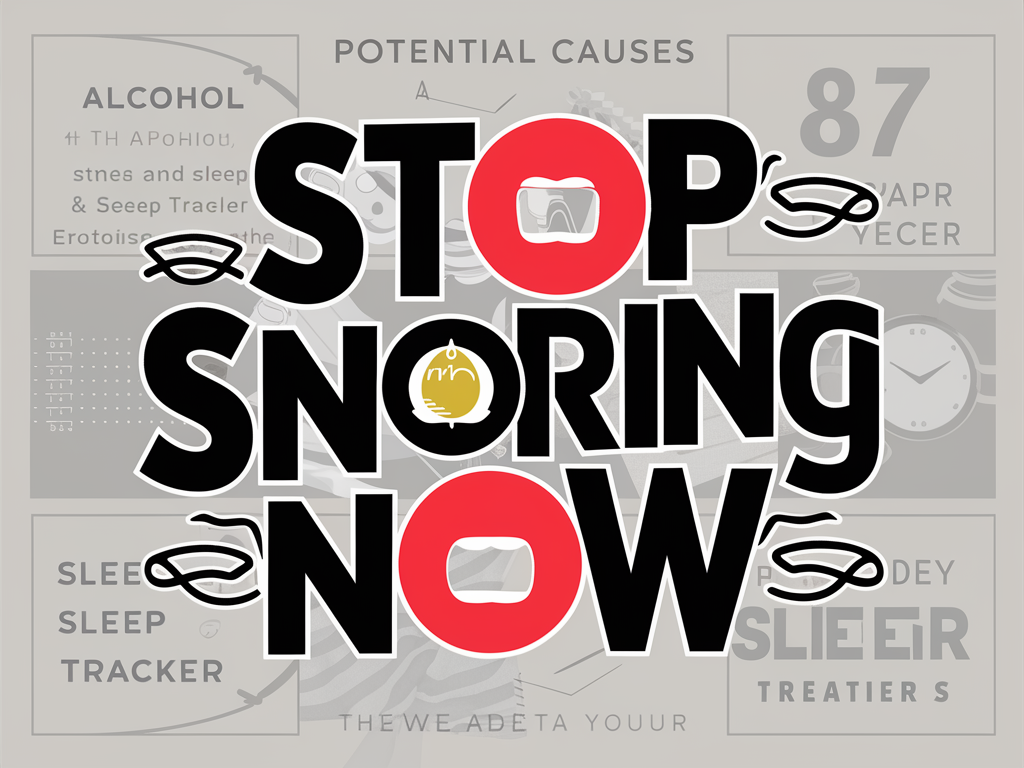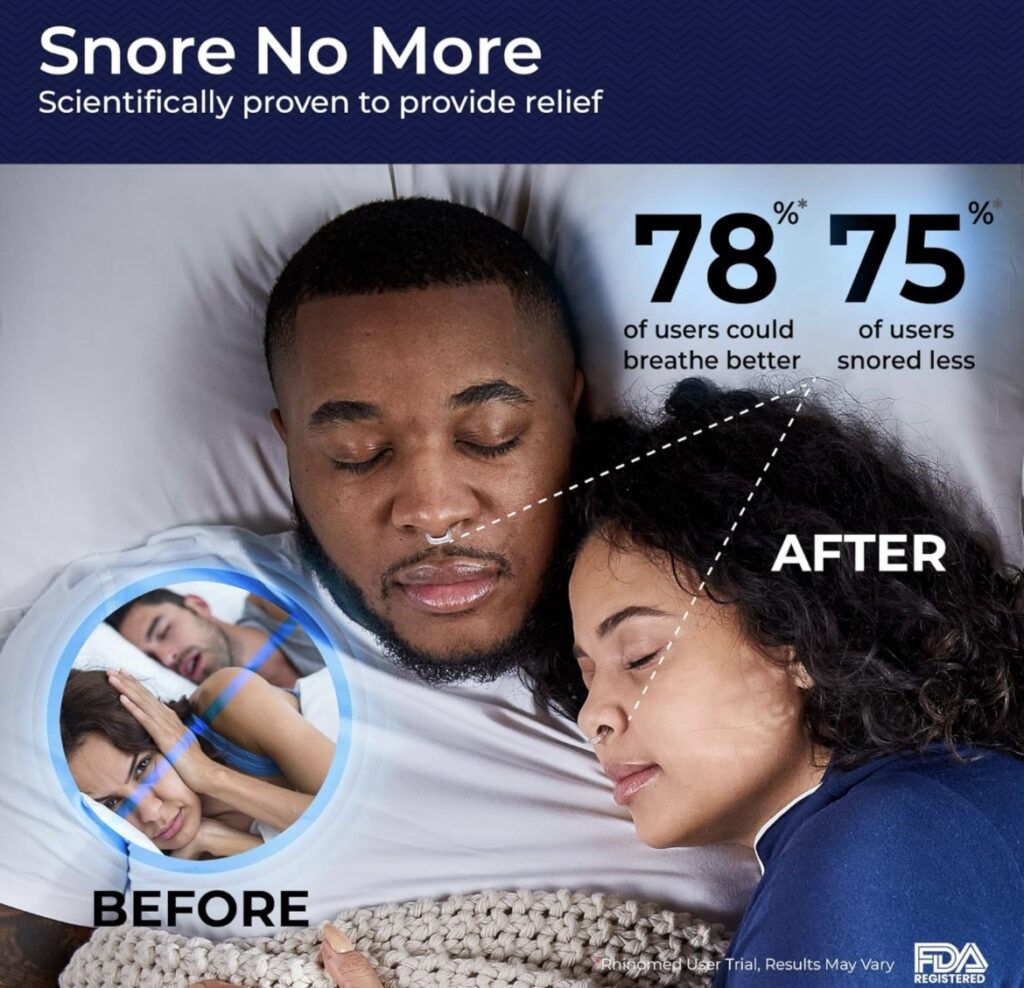
Are you or your partner battling with the nightly symphony of snores? You’re not alone. Snoring affects millions of people worldwide, disrupting sleep and affecting overall health. But fear not! Understanding the causes of snoring and exploring effective remedies can turn those noisy nights into peaceful slumber. From the wonders of nasal dilators to the transformative power of anti-snoring mouth guards, this article will guide you through proven solutions to reduce or eliminate snoring. We’ll dive into the science behind snoring, uncover lifestyle changes that make a difference, and highlight products designed to give you back the gift of quiet nights. Say goodbye to sleepless nights and hello to restful sleep with insights and recommendations that promise relief for snorers and their partners alike.

What Causes Snoring?
Snoring might be a common issue, but its causes are as varied as the individuals it affects. At its core, snoring is the result of air struggling to move freely through your nose and throat during sleep. This air resistance makes the surrounding tissues vibrate, producing the all-too-familiar snoring sound. Let’s unpack the main culprits behind this noisy nighttime nuisance.
Anatomy and Physical Conditions
For some, the physical layout of their airways—anatomical peculiarities like a deviated septum, enlarged tonsils, or a long uvula—can be natural snoring triggers. These structural traits can narrow the airway, making air turbulence, and hence snoring, more likely.
Nasal Issues
Chronic nasal congestion or a blocked nose requires extra effort to pull air through the nasal passages while sleeping. This can create an amplified vacuum in the throat, leading to snoring. It’s here that solutions like the MUTE by Rhinomed Nasal Dilator for snore reduction can be a game-changer, increasing airflow and minimizing the snore factor.
Lifestyle Factors
Weight plays a significant role in snoring. Excess body weight, especially around the neck, can squeeze the throat’s diameter, making it more prone to collapse during sleep, triggering snoring. Additionally, alcohol and sedatives can relax the throat muscles too much, contributing to snoring.
Sleep Position
Your sleeping position can also be a key player in snoring. Sleeping on your back, for instance, allows gravity to pull the tongue and soft tissues to the back of the throat, which can block the airway and result in snoring. This is where adjusting your sleep setup, perhaps with the help of an ergonomic pillow like the DONAMA Cervical Pillow, can encourage a more snore-friendly sleeping posture.
Understanding the underlying causes of snoring is the first step towards finding a solution. Whether it’s making lifestyle adjustments, trying out a nasal dilator, or simply changing your sleeping position, the key is to address the root cause. In the following sections, we’ll explore the various remedies and lifestyle changes that can help you and your loved ones enjoy quieter, more restful nights.

How Does Snoring Affect Health and Sleep Quality?
While snoring might be a source of jokes among friends and family, its impact on health and sleep quality is no laughing matter. Consistent, loud snoring not only disrupts the sleep of those within earshot but can also have significant repercussions for the snorer themselves.
Sleep Disruption
Frequent snoring can fragment the quality of sleep, leading to a condition known as sleep fragmentation. This can cause the snorer to experience poor sleep quality, resulting in daytime drowsiness, irritability, and difficulty concentrating. It’s a vicious cycle where snoring leads to poor sleep, which in turn can exacerbate snoring.
Cardiovascular Strain
Chronic snoring, particularly when associated with obstructive sleep apnea (OSA), can put extra strain on the heart. People with untreated sleep apnea are at an increased risk for high blood pressure, coronary artery disease, heart attacks, and stroke. The repeated episodes of low oxygen levels during the night can lead to these severe health complications over time.
Mental Health Concerns
The lack of restorative sleep due to snoring can also take a toll on mental health. Studies have linked poor sleep quality with an increased risk of depression, anxiety, and other mental health disorders. The irritability and mood swings that often accompany sleep deprivation can strain relationships, adding another layer of stress.
Relationship Tension
Speaking of relationships, snoring can create significant tension between partners. The sleep disturbance caused by loud snoring can lead to separate sleeping arrangements and diminish intimacy, putting a strain on otherwise healthy relationships.
Given these impacts, it’s crucial to address snoring not just for the sake of quiet nights but for overall health and well-being. Solutions like maintaining a healthy weight, adjusting sleep positions, or using assistive devices like the Anti-Snoring Mouth Guard can offer relief. For those concerned about air quality and its effect on nasal congestion, integrating a MORENTO Air Purifier into the bedroom can also make a significant difference.
Addressing snoring is not just about improving sleep; it’s about enhancing your quality of life. By taking steps to mitigate snoring, individuals can improve their health, relationships, and overall daily functioning.

Identifying Who is at Risk
Snoring can affect anyone at any age, but certain factors significantly increase the risk of turning those quiet nights into a snore-filled symphony. Understanding who is more susceptible can help in taking early actions to prevent or reduce snoring. Let’s delve into the primary risk factors:
Age
As we age, the muscle tone in our throat decreases, and the throat becomes narrower. This natural aging process can increase the likelihood of snoring. While we can’t turn back the clock, lifestyle adjustments and throat exercises can help mitigate this risk.
Anatomy
Individuals with particular anatomical features, such as a thick neck, enlarged tonsils, or a longer uvula, might find themselves more prone to snoring. These physical traits can narrow one’s airways, increasing the chances of airway obstruction during sleep.
Gender
Men are more likely to snore or have sleep apnea compared to women. This difference is partly due to the distribution of fat and differences in airway anatomy. However, the risk for women can increase after menopause.
Lifestyle Choices
Smokers, heavy drinkers, and those who are overweight are at a higher risk for snoring. Smoking can irritate and inflame the airways, alcohol relaxes the throat muscles, and excess weight around the neck can squeeze the internal diameter of the throat.
Nasal and Sinus Problems
Chronic nasal congestion or sinus issues can block airways, making inhalation difficult and creating a vacuum in the throat, leading to snoring. Addressing these issues with appropriate treatments can significantly reduce snoring.
Knowing these risk factors is crucial in taking proactive steps towards reducing the likelihood of snoring. For instance, tackling weight issues not only has a myriad of health benefits but can also lessen snoring. Tools like the Etekcity Smart Scale can aid in tracking fitness progress, offering a way to monitor improvements that could lead to quieter nights.
Addressing snoring requires a comprehensive approach, considering the multifaceted risks and causes. By understanding who is at risk and why targeted interventions, from lifestyle changes to utilizing specific products aimed at easing breathing, can make all the difference in achieving restful, snore-free sleep.

Exploring Treatments and Remedies
Once you’ve pinpointed the potential causes of snoring and identified the risk factors, the next step is to explore the various treatments and remedies available. Snoring solutions range from simple lifestyle adjustments to medical interventions, depending on the severity and underlying causes. Here’s a rundown of the most effective strategies to curb snoring:
Lifestyle Changes
- Weight Management: Shedding extra pounds can reduce fatty tissue in the back of the throat, decreasing or even stopping snoring.
- Sleep Position: Sleeping on your side can prevent the tongue from blocking the throat and reduce snoring. A specially designed pillow, like the DONAMA Cervical Pillow, can encourage sleeping in a non-supine position.
- Limit Alcohol and Sedatives: Avoiding these substances close to bedtime can reduce snoring by preventing excessive relaxation of throat muscles.
Assistive Devices
- Nasal Dilators: Products like the MUTE by Rhinomed Nasal Dilator increase airflow by opening nasal passages, addressing one of the common causes of snoring.
- Mouthguards: Devices such as the Anti-Snoring Mouth Guard help keep the airway open by positioning the jaw or tongue optimally during sleep.
Medical Treatments
- CPAP Machines: For those with obstructive sleep apnea, a CPAP machine delivers air pressure through a mask, keeping the airway open during sleep.
- Surgery: Procedures like UPPP (uvulopalatopharyngoplasty), thermal ablation palatoplasty, and tonsillectomy increase the size of your airway by surgically removing tissues or correcting abnormalities.
Home Remedies and Exercises
- Humidifiers: Adding moisture to the air can ease breathing by reducing nasal congestion. The MORENTO Air Purifiers also improve air quality, which can contribute to better sleep.
- Throat Exercises: Strengthening the muscles around the airways can reduce snoring. These exercises involve pronouncing certain vowel sounds and curling the tongue in specific ways, performed consistently over time.
Combining these treatments and remedies can often produce the best results. For example, someone might use a nasal dilator to improve airflow while also making lifestyle changes such as losing weight and reducing alcohol consumption. It’s about finding the right mix that addresses the specific causes of your snoring.
Remember, it’s important to consult with a healthcare provider before starting any new treatment, especially if your snoring is severe or accompanied by symptoms of sleep apnea, such as gasping for air during sleep, excessive daytime sleepiness, or morning headaches. They can provide a tailored approach based on a thorough evaluation of your condition.

Can Lifestyle Changes Help Reduce Snoring?
Absolutely! Making some strategic lifestyle adjustments can have a significant impact on reducing snoring. It’s often the simplest changes that can lead to a night of more restful sleep for both the snorer and their partner. Here are a few modifications worth considering:
Watch Your Weight
Can shedding a few pounds really make a difference? Yes, it can. Excess weight, especially around the neck, can squeeze the internal diameter of the throat, increasing the likelihood of it collapsing during sleep, which can cause snoring. Tools like the Etekcity Smart Scale not only help you track your weight but also offer insights into body fat percentage, muscle mass, and more, aiding in a comprehensive approach to weight management.
Shift Your Sleep Position
Why does sleeping on your side help? When you sleep on your back, your tongue and soft palate may collapse to the back of your throat, blocking the airway and causing snoring. By sleeping on your side, you can keep the airway more open, which might help reduce snoring. An ergonomic pillow, like the DONAMA Cervical Pillow, can support maintaining the correct posture throughout the night.
Rethink Your Nightcap and Sedatives
How do alcohol and sedatives affect snoring? Consuming alcohol or taking sedatives before bed can relax the muscles in your throat, increasing the risk of snoring. Limiting these substances can help keep your airway open throughout the night.
Create an Ideal Sleeping Environment
Does air quality really affect snoring? Yes, allergens in your bedroom and dry air can irritate the nose and throat, exacerbating snoring. A device like the MORENTO Air Purifiers can help by removing allergens and pollutants from your sleeping area, while a humidifier adds moisture to the air, easing breathing.
Implementing these lifestyle changes can not only reduce snoring but also improve your overall health and well-being. It’s about creating habits that support a healthier sleep cycle and, by extension, a happier life.

Are There Any Home Remedies or Exercises That Can Help With Snoring?
The best place to start is at MotivateTheWeight.com for free weight loss info and help. You might be surprised to learn that several home remedies and simple exercises can make a significant difference in reducing snoring. These methods focus on strengthening the muscles around the airways and ensuring clear nasal passages, which can help mitigate the factors that lead to snoring. Let’s dive into some effective strategies:
Nasal Passages: Keep ‘Em Clear
Why does clearing nasal passages matter? A blocked nose can force you to breathe through your mouth while sleeping, increasing the likelihood of snoring. Rinsing the nasal passages with a saline solution can help. For those seeking a more direct approach, nasal dilators like the MUTE by Rhinomed Nasal Dilator physically open the nasal passages, enhancing airflow and reducing snoring.
Stay Hydrated: Does It Really Help?
Absolutely. Dehydration can lead to the thickening of mucus in the mouth and throat, which can stick the soft palate and uvula together, increasing snoring. Drinking plenty of fluids throughout the day can keep this mucus more fluid and less likely to cause blockages.
Throat Exercises: Tone Your Way to Silence
Can exercises actually reduce snoring? Yes, they can. Strengthening the muscles in the throat can prevent them from collapsing during sleep, which is a common cause of snoring. Simple exercises, such as pronouncing vowel sounds loudly or singing, can strengthen these muscles over time.
Optimize Your Bedroom Environment
How does your bedroom environment affect snoring? Factors like allergens and dry air can contribute to snoring. An air purifier, such as the MORENTO Air Purifiers, can reduce allergens in your bedroom, while a humidifier adds moisture to the air, preventing dryness that can lead to snoring.
Implementing these home remedies and exercises doesn’t just offer a potential reduction in snoring; it can also lead to better sleep quality and overall health. It’s about making small adjustments that can lead to significant improvements, turning the dream of a quiet night into a reality.
When to Seek Professional Help
While many cases of snoring can be managed with lifestyle changes, home remedies, or over-the-counter aids, there are times when professional medical advice is essential. Recognizing the signs that indicate a need for professional intervention can help ensure not only a good night’s sleep but also overall health and well-being. So, how do you know when it’s time to see a doctor about your snoring?
Persistent, Loud Snoring
If your snoring is loud enough to disrupt the sleep of others and persists most nights, it could be a sign of obstructive sleep apnea (OSA), a condition that requires medical evaluation.
Pauses in Breathing
Observe or ask your partner if they notice pauses in your breathing during sleep, followed by gasping or choking sounds. This pattern is characteristic of sleep apnea, a serious condition that increases the risk of heart disease, stroke, and diabetes.
Excessive Daytime Sleepiness
Struggling to stay awake during the day, feeling extremely drowsy, or having difficulty concentrating might indicate that your snoring is impacting the quality of your sleep, necessitating a professional consultation.
Sore Throat or Dry Mouth Upon Waking
Regularly waking up with a sore throat or dry mouth can be signs of breathing through the mouth all night due to blocked nasal passages or snoring, which might require a specific treatment plan.
High Blood Pressure
Snoring, especially when associated with sleep apnea, can contribute to or worsen high blood pressure. If you have hypertension and snore, discussing your snoring with your healthcare provider is crucial.
Relationship Stress
When snoring becomes a source of tension between partners, affecting shared sleep quality and overall relationship satisfaction, seeking a solution becomes not just a matter of health, but of happiness.
If you recognize any of these signs, consulting with a healthcare provider or a sleep specialist can provide clarity and open the door to effective treatment options. In some cases, they might recommend a sleep study to diagnose conditions like sleep apnea. From CPAP machines to surgical options, professional guidance can tailor a treatment plan that addresses the root cause of your snoring, leading to improved sleep quality and health outcomes.
Taking the step to seek professional help is a proactive approach to managing snoring. It’s about prioritizing your health and well-being, ensuring that both you and your loved ones can enjoy the benefits of restful, uninterrupted sleep.
As an Amazon Associate we earn from qualifying purchases through some links in our articles.




